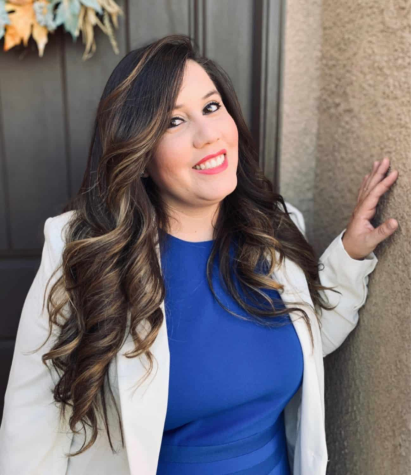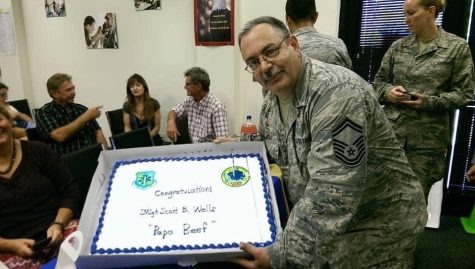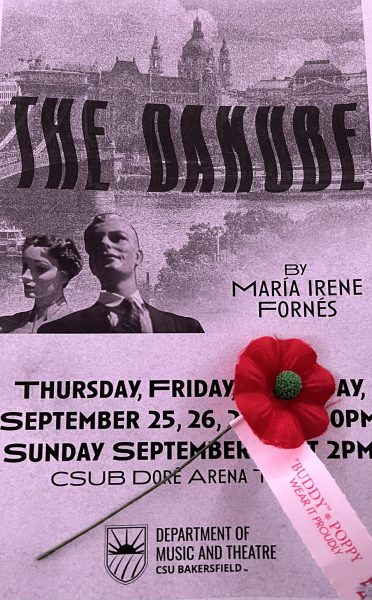Two sides of the same coin: Serving our country and communities
December 16, 2022
I had the opportunity to speak with Jamie Pacheco, Veteran Success Center Coordinator, about her experience with her loved ones serving, and Scott Wells, Facilities Manager, about his experience in the Air Force.
Pacheco had multiple people close to her that have served, one of whom was her brother. She described her brother as her “partner in crime,” so when he deployed, it was hard on the family to have a loved one away.

She always worried about him and saw the worst portrayed in the media. “Whenever something catastrophic happened, a bombing or a helicopter went down, I would always think is that my brother? Are we going to get a phone call? When are we going to hear from him?” said Pacheco.
This is a common theme I have seen among families or friends of those who are deployed. Their families and friends are constantly worried and anxious about the safety of their family members or loved ones. I know I have also had this experience with my close friends being deployed.
During the time her brother was deployed, Skype was beginning to take off, so they were able to speak on there every so often. If not then he would call, but it wasn’t consistent.
Pacheco’s brother-in-law was enlisted as well, so she saw the first-hand impact it had on her sister. “All the wives’ husbands would be gone so it was just all the wives on the block. It was amazing to see all the women, whose husbands were deployed, on the block facing the same challenges and going through them together. They really relied on each other for that system of support.”
By having this kind of support with these women going through the same struggles, they were able to understand each other in ways that others could not. Having the ability to lean on those that understand how you are feeling and what you are going through in a time like this can make a tremendous difference.
“I didn’t necessarily realize how important that was to the wives until I got older and became a mother myself,” said Pacheco.
Having a child makes you see things from a different perspective. At first, Pacheco did not realize the impact of having a support system, but having her own child put that system into perspective and the necessity of it.
“I saw my sister do it all, she would mow the lawn and fix the garbage disposal, because her husband was gone. It was definitely a different perspective on that,” said Pacheco.
Pacheco also met her husband, Patrick Pacheco, once he was out of his military service. She stated, “I didn’t sit through deployments as a wife, but he did go back into the reserves.” The experiences Pacheco had with loved ones during deployment were with her brother and brother-in-law.
I also spoke with Scott Wells, who was a member of the Air Force along with being the facilities manager on campus. He was nicknamed “Papa Beef.” The “Beef” stands for: Base Emergency Expeditionary Force.

While he was in B.E.E.F., also known as combat engineers, he did humanitarian deployments. They built facilities for doctors and nurses to help treat people.
Wells signed up for the Air Force in Nov. 1978 but did not officially go in until July 1 due to delayed enlistment. He began in open mechanics in the aeroport.
Wells was gone 250 days out of the year during the Cold War.
He spent seven years in Dover and then got orders to go to Turkey. “My dad got cancer and I asked for a humanitarian cancellation to be left in place. I wanted to stay in Dover because that was six hours from my dad,” said Wells.
Wells was told they would cancel his orders, but he would be moving. They gave him the option of Plattsburg or Griffiths. He chose Griffiths, but only if his wife could also be transferred with him. They were then both transferred to Griffiths.
They spent 11 months in Griffiths, NY. “The mission there was all about nuclear, B52s, nuclear weapons, and 135’s. There were only 5 of us on the base in the same career field. As an E5, I was ranking enlisted person, so I was the Air Terminal Manager.”
During his time in Griffiths, Wells was working 20-hour days. “They didn’t care, we would work our 8-hour day, do our job, and 2 hours later they would call us in to do an all-night recall loading 135’s.”
His time in Griffiths was during strategic air command, which as Wells described, drove him nuts.
He wanted to get out, so he found a job in California as an equipment operator at the guard base. He quickly advanced from an E5 to an E8. His goal was to be an E7, but he made it to an E8, which was the cherry on top for him.
Wells retired after he was hurt in Guantanamo. He blew his shoulder out and once he had realized he was hurt, the rest of his injuries began to surface. Injuries that he “didn’t really pay attention to as a young airman.” These injuries are his back, knees, neck, hands, and numb fingers.
“When I retired from the Air Force in 2015, I was lost, and I didn’t know what to do. I never had a civilian job other than a paper boy before I went in,” said Wells.
He then found a job at Channel Islands as a civilian and went from a GS4 to a GS9. This is where he became the Prime B.E.E.F. Manager. “I was very good at what I did and got recognized by the inspector general multiple times,” said Wells.
“I was a gone away husband and dad for almost 28 years. I was only home 6 days a month during civil service,” said Wells. This was hard on both Wells and his family.
Wells has the utmost respect for his wife and everything she does. She has stuck by his side through it all and he is grateful for it.


![Scott 1[10998]](https://therunneronline.com/wp-content/uploads/2022/12/Scott-110998-900x675.jpg)



